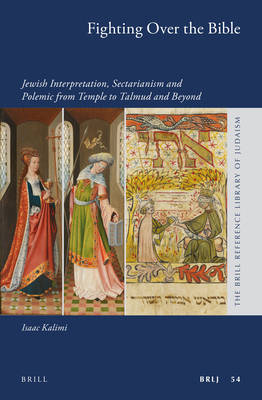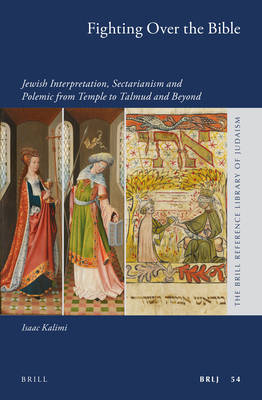
- Retrait gratuit dans votre magasin Club
- 7.000.000 titres dans notre catalogue
- Payer en toute sécurité
- Toujours un magasin près de chez vous
- Retrait gratuit dans votre magasin Club
- 7.000.0000 titres dans notre catalogue
- Payer en toute sécurité
- Toujours un magasin près de chez vous
Fighting Over the Bible
Jewish Interpretation, Sectarianism and Polemic from Temple to Talmud and Beyond
Isaac Kalimi
242,95 €
+ 485 points
Description
Fighting over the Bible explores the bitter conflicts between main stream Jews and their internal and external opponents, especially between particular Jewish groups such as Pharisees, Sadducees, Qumranites, Samaritans, Rabbanites and Karaites, as well as with Christians and Muslims regarding their interpretations of Jewish Scripture. The Hebrew Bible/Old Testament is an important sacred text for all branches of the Abrahamic faiths, but it has more often divided than unified them. This volume explores and exemplifies the roots of these interpretive conflicts and controversies and traces the rich exegetical and theological approaches that grew out of them. Focusing on the Jewish sources from the late Second Temple period through the high Middle-Ages, it illustrates how the study of the Bible filled the vacuum left by the Temple's destruction, and became the foundation of Jewish life throughout its long conflicted history.
"This is a rich and engaging volume, one of impressive erudition and sound scholarship. It demonstrates a deep understanding of the history that it seeks to unravel and document. I especially appreciate the attention given to primary sources in their original languages (usually accompanied by English translation) and the balanced and fair-minded handling of controversial issues." - Richard A. Taylor, DTS (Dallas Theological Seminary), in: Voice (2017)
""In this passionate account, Isaac Kalimi crystallizes a decade of personal research into the dynamics that shaped Jewish interpretation of the Tanak from the second century B.C.E. to the sixteenth century C.E. This is a startlingly honest book that profiles the Bible as a source of conflict rather than mutual understanding among the Abrahamic traditions...It will be a fine addition to the libraries of religious studies departments, seminaries, and study groups that are committed to interfaith dialogue." - Michael W. Duggan, in: Catholic Biblical Quarterly 81 (2019)
"... Each of these chapters carries the overall theme of how the sacred text of the HB has been interpreted and why this has prompted controversy and conflict...The arguments are straightforward and have a clear conclusion at the end of each chapter. The Appendix 'And What Now?' gives a strong analysis of how disagreeing factions can reconcile ideas for a more peaceful future and presents a persuasive argument for peaceful coexistence between Jews and Christians in the modern world." - Jacob Greenhouse, in: Journal for the Study of the Old Testament 43 (2019)
"This is a rich and engaging volume, one of impressive erudition and sound scholarship. It demonstrates a deep understanding of the history that it seeks to unravel and document. I especially appreciate the attention given to primary sources in their original languages (usually accompanied by English translation) and the balanced and fair-minded handling of controversial issues." - Richard A. Taylor, DTS (Dallas Theological Seminary), in: Voice (2017)
""In this passionate account, Isaac Kalimi crystallizes a decade of personal research into the dynamics that shaped Jewish interpretation of the Tanak from the second century B.C.E. to the sixteenth century C.E. This is a startlingly honest book that profiles the Bible as a source of conflict rather than mutual understanding among the Abrahamic traditions...It will be a fine addition to the libraries of religious studies departments, seminaries, and study groups that are committed to interfaith dialogue." - Michael W. Duggan, in: Catholic Biblical Quarterly 81 (2019)
"... Each of these chapters carries the overall theme of how the sacred text of the HB has been interpreted and why this has prompted controversy and conflict...The arguments are straightforward and have a clear conclusion at the end of each chapter. The Appendix 'And What Now?' gives a strong analysis of how disagreeing factions can reconcile ideas for a more peaceful future and presents a persuasive argument for peaceful coexistence between Jews and Christians in the modern world." - Jacob Greenhouse, in: Journal for the Study of the Old Testament 43 (2019)
Spécifications
Parties prenantes
- Auteur(s) :
- Editeur:
Contenu
- Nombre de pages :
- 356
- Langue:
- Anglais
- Collection :
- Tome:
- n° 54
Caractéristiques
- EAN:
- 9789004339101
- Date de parution :
- 09-03-17
- Format:
- Livre relié
- Format numérique:
- Genaaid
- Dimensions :
- 155 mm x 236 mm
- Poids :
- 657 g

Les avis
Nous publions uniquement les avis qui respectent les conditions requises. Consultez nos conditions pour les avis.






